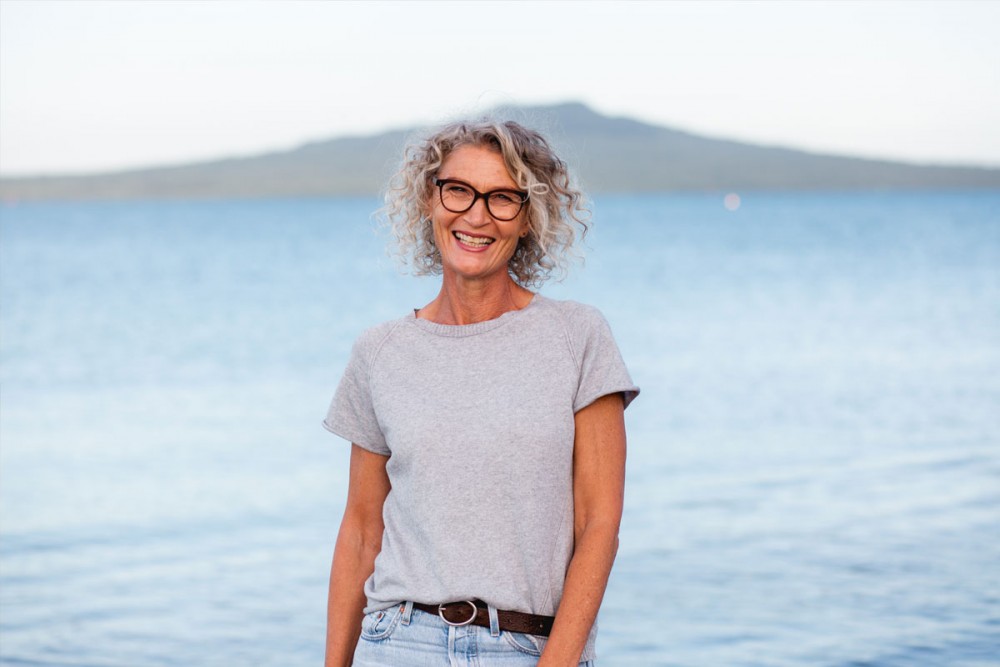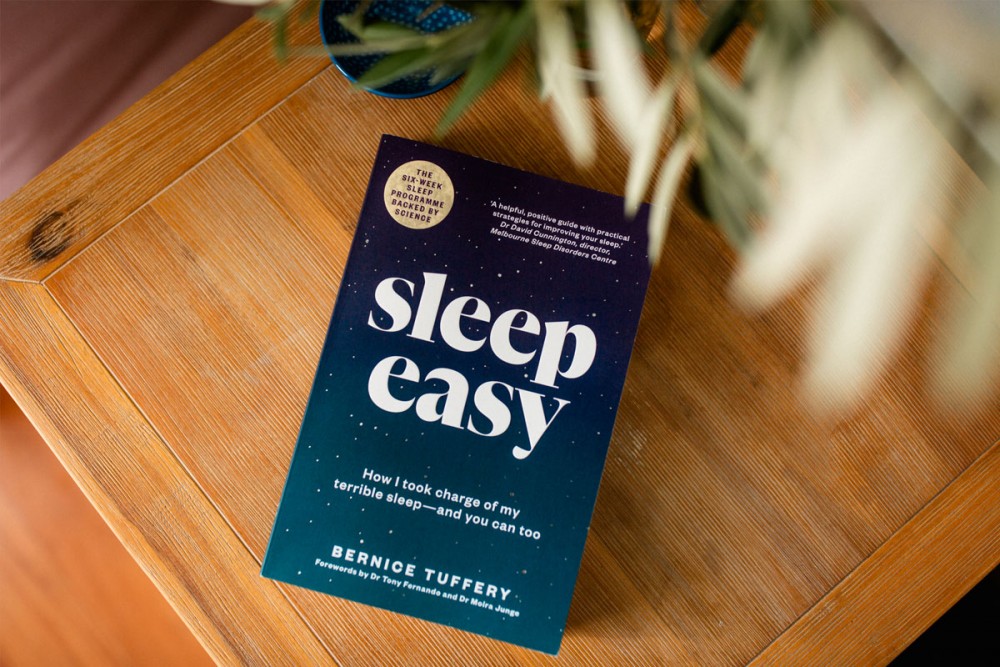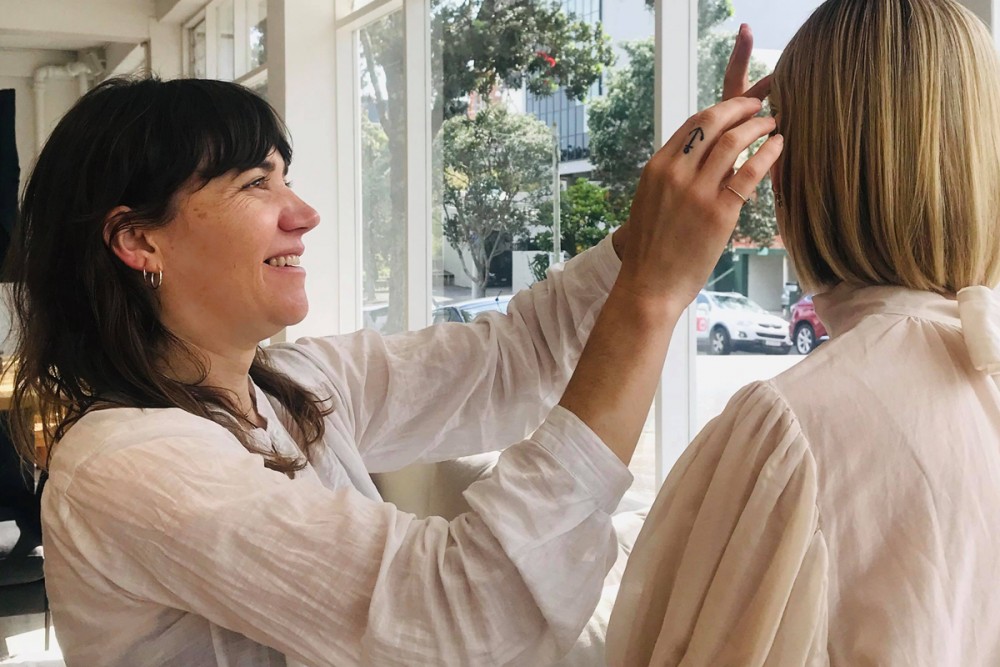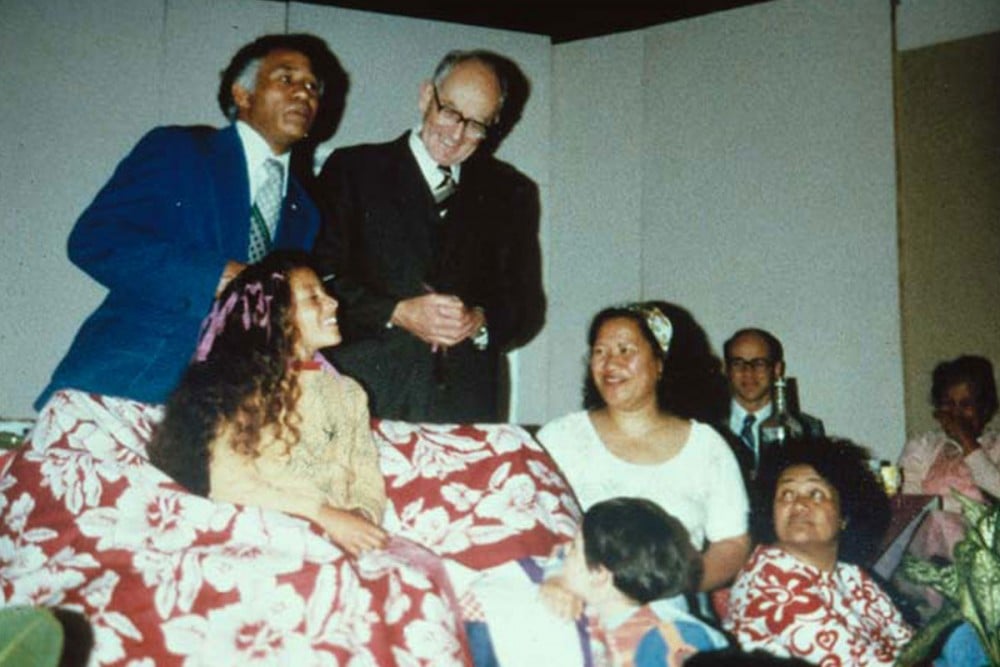
Lauren: I’m so excited to speak with you about sleep! I’ve known you for a long time as a client of colleen, I know your hair really well and I also know that you work as a qualitative researcher and are highly respected in that field. Could you tell me a little bit about your background and the journey taken in creating your book ‘sleep easy’ about taking charge of terrible sleep?
Bernice: For most of my life I was one of those annoying people that could fall asleep easily and didn’t have to think about sleep. It was just one of those normal natural bodily functions that happened every night with no worries but motherhood changed all that for me - my sleep started unravelling. I tried a lot of things but nothing worked in a meaningful way. It wasn’t until I applied the research skills that I found there is a clinically proven, natural and sustainable way out of insomnia.
If there’s a problem, I want to know what’s going on, how do we solve it and how we do things differently. As a qualitative researcher, a lot of my work is around behaviour change, whether it’s in the commercial sector getting people to buy one product versus another product. In social research, it can be encouraging people to change an unhelpful behaviour to a more helpful behaviour.
When I got to that point where my sleep was so dreadful that it was not tolerable, not sustainable, I thought Hang on! There’s got to be a way through this, I’m an intelligent researcher, I need to apply my own skillset to this problem and find out how to sleep.
Did you try going down any other paths first?
Sleep issues are kind of sneaky, they can creep up on you. And because as humans we are really good at adapting, I was adapting to living with less sleep. For a long time I thought I was doing ok. But over time it really affected me in terms of my ability to focus, my memory, my productivity, my energy levels, my mood, and immunity. And yet I was had been trying all of those things that we know we should do to improve sleep.
What are those things?
For me, I was thinking - Okay, I've got to catch up my sleep, so I'd go to bed early to have a better chance of getting my hours in or I would try to catch up on the weekend, giving myself more opportunity to sleep. I would do things like conserving my energy so that I could make it through the day. I would have hot baths. I would drink chamomile tea. I would try this supplement and that supplement, and there's a lot of supplements you can try, and I was always trying something. So, yeah, I had a cupboard full of supplements that I had tried.
At the same time, I was adapting and learning to live with it and I would have shortcuts around it; get that coffee in first thing in the morning, use stimulants so that you can survive the day, then knock yourself out with a glass of wine in the evening. All those kinds of quick-fix things that people do to cope when feeling tired.
Do you think there are many people out there practising these coping mechanisms that potentially don't even realize they have a sleep disorder or sleep issues?
Oh, absolutely. The prevalence of sleep issues is high. New Zealand statistics are not wildly different from elsewhere in the world, it's about one in three adults having trouble sleeping. It is so common.
In NZ that would be millions of people.
It's equal to almost all of Auckland. This is not every night but it's enough for it to be a problem because sleep deficiency affects so many aspects of your life in terms of short term and long-term health, physical and mental health.
Did you experience a personal cost as a result of your sleep deficits?
Absolutely. And like I said, it sneaks up on you. You're not even aware that you're changing because it's such a gradual erosion of who you are. It wasn't until things got really extreme for me, where I stopped and took a look at myself and thought this is not who I am. Lack of sleep affected my mood. It affected my productivity. My concentration and my memory were off, which affected the work that I chose to take on. I would take less responsibility just to preserve myself and protect myself. In terms of relationships, being sleep deprived affects how you engage with other people. Everything is an effort.
I was eating differently, craving carbs and leaning towards food that I knew were not helpful. I was doing less exercise and part of that was to conserve my energy, part of it was because I just had no motivation. My world was just very gradually getting smaller and smaller and smaller.
How did you climb out of the bad sleep hole?
I had reached that point where I just really stopped and took a good look at myself and thought this is not me. I was pretty desperate and I felt that there has to be a way through this. I can't be the only one that is suffering from sleep issues, and I didn't want to take sleeping pills.
I knew that if I went to the doctor, that's probably what I would get. I know there are situations where sleeping pills are appropriate but I wanted a natural and sustainable solution. I finally talked to my GP about it. And she said that maybe I needed to see a sleep specialist. At that time there was a two-month wait to see the specialist.
I bet that feels like a long time when you're already on the edge?
Yeah, especially when you've reached that point of putting your hand up for help. There is a shortage of sleep experts in NZ and it is incredibly expensive. I was at that point where I was so desperate, I was going to find the money. I would do it. I checked with my insurance company and they wouldn't cover it. I was in a position where I could rustle up that money, but I was very aware that there would be many people with sleep difficulties that needed help who wouldn’t be able to pay for this sort of help.
Meanwhile, I had 8 weeks to wait. I felt really motivated to take action. I decided to figure out what I could do in the meantime. I looked at the clinical research that had been done and I was stunned to discover That the internationally recognized treatment for insomnia is a non-drug therapy. When I read what the protocols were, I thought - This is so sensible and so doable. I started using those protocols, trying them out, setting myself up as an experiment - What if I do this? What happens to my sleep? And it started improving.
The better my sleep became the more excited I was to apply this stuff. I had better mental clarity, my memory was improving, I was more productive. I had more energy, my eating changed. It revolutionized my life, and I started feeling more like myself again. By the time my appointment came up with the specialist, I didn't really need to see him but I was so excited about what had happened, I thought I have to talk to this guy and find out why is this information not available to people? And so, I did go to that appointment and I had that conversation with him. I wanted to know why New Zealanders with insomnia didn't have access to the information. And it's just the same elsewhere in the world. CBTi has really low awareness and there is a shortage of qualified practitioners.
What is CBTi?
It's cognitive behavioural therapy for insomnia. Essentially ongoing insomnia is a learned behaviour. It’s a series of unhelpful thoughts and behaviours that perpetuate insomnia. The more we continue those behaviours and thoughts, the more elusive is our sleep. CBTi is about waking ourselves up to these habits, unlearning the unhelpful thoughts and behaviours and learning helpful thoughts and behaviours instead.
The use of stimulants is such a common coping strategy for sleep deficiency. You might habitually reach for a coffee or chocolate without appreciating the impact caffeine has on your biology and your body’s ability to fall or stay asleep tonight.
I’m literally drinking coffee right now.
I've had mine already. I love my coffee too. But I know now my body’s sensitivity to caffeine so I know what I can get away with, without sabotaging my own sleep.
Which comes first – changing the practical things or changing the way you think?
It depends on the individual. It's about understanding how sleep works. A lot of us don't have much insight into what a healthy sleep even looks like. The usual perception is that we’ve gotta have 8 hours. The healthy range for adults is between 7 to 9 hours of sleep. My aspiration was always for 8 hours of sleep but it turns out that my body doesn’t need that much. If you're trying for more sleep than your body needs, then that's unhelpful. You are working against your own biology. Knowing the sleep duration that’s appropriate for you is really important.
It's also helpful knowing that sleep occurs in stages throughout the night and understanding how those cycles work. Your body cycles through stages of light and deep REM sleep all night long. As you switch from some of these stages you may wake. This is part of the natural order of things and not something to panic about.
The more anxious you are about your sleep, the less likely you are to sleep. That's how the problem feeds itself because you get worried about not sleeping and worried about what the daytime consequences will be. All that anxiety is triggering a physiological response, which makes it impossible for your body to fall asleep, right? The more you try to fix this and the more you try to make yourself sleep, the less able you are to sleep. The act of trying sets up performance anxiety. Once you understand this cycle you can interrupt it.
When you're in that cycle and your focus is disrupted, your memory is disrupted, surely your mental health will be disrupted? When you are in a vulnerable place how do you go about mustering up the strength or resolve to help yourself?
It’s about reaching that point where you’ve had enough sleep difficulties and feel genuinely motivated to do something about it. It's essential to have a reason why you want things to be different because you will have to motivate yourself. There are things that you are going to have to learn, and you are going to have to experiment with some new behaviours and some new thoughts, and it will be a zig-zag path.

Is your book ‘Sleep Easy’ structured in the way of a practical step by step guide to good sleep?
Sleep Easy takes you through step by step, night by night. One of the things that I found when I was on my sleep improvement journey, was that info overload is unhelpful. Even with my skills as a researcher, I found it daunting to navigate my way and figure out what I was supposed to do.
What I was after at that time was a How-to Guide. I just wanted someone to strip out all the stuff that I didn’t need and to tell me what to do.
And I wanted it from the point of view of somebody that understood the experience. That's the piece that I thought was really missing.
You’ve done all the googling for us!
I’ve done my time on google scholar. I’ve done the interviews, read the clinical manuals. I’ve experimented with my own sleep and helped others. Sleep Easy is road tested in reality.
As a teenager, so many figures that I looked up to would talk and almost brag about how little sleep they needed, do you think that our culture contributes to one in three people experiencing sleep disorders?
There's a tiny, tiny, tiny percentage of people that can do that. For most of us, it’s genuinely unworkable long term, and there are likely to be health consequences. Our culture is all about Sleep when you’re dead! It's about how much you can fit in, it’s about how productive you are, how busy you are, how much you got going on. That’s what’s looked up to and admired, that’s the conversation.
In our society, we're not very good at switching off. Technology is 24/7, our work is in our lives, even when we come home. We've got access to Netflix forever, our screens are just with us all the time. It's not just about the blue light it’s about the mental stimulation that goes with engagement with technology, and so we've got to really conscientiously step away from the screen.
We're not necessarily talking to each other about sleep. How would I go about supporting someone in my life who might be suffering from a sleep disorder or chronic bad sleep?
The conversation is really limited when it comes to sleep, and often we're not talking about it in any meaningful way. It's kind of an unglamorous thing to talk about because you're basically owning up to feeling like shit and not being very productive. It can feel really lonely if you’re the one awake in the middle of the night or going through your day as a functional zombie. If you want to help somebody with sleep difficulties start with kindness and compassion.
Somebody that is experiencing sleep issues tends to be quite hard on themselves. They may be feeling like they are failing at something really fundamental that everyone else can do. Reassure them that sleep difficulty is prevalent and they are not alone.
Avoid the temptation to give them quick fix tips or share an anecdote about what an awesome sleeper you are. Chronic insomnia is harrowing. Let them know that you care and that there is help available.
One of my favourite things is quizzes and I’m looking at your book right now and chapter one includes an incredible diagnostic quiz.
It was essential for me to include an initial self-diagnosis tool, so there's an opportunity to just take stock and assess what's going on with your sleep. Chapter One goes through many different aspects that can be contributing to your sleep issues so that you can get a more objective picture.
If it sounds like you've got a sleep related breathing disorder, get yourself to the doctor. This is really important. Don't muck around. Go to your doctor immediately. Or if it’s bruxism/teeth grinding that’s keeping you awake go to see your dentist. Chapter One is about empowering you get your sleep information together and know your next steps.
For people who do fall asleep at the drop of a hat, how is that? What so different for them?
Whether they know it or not they are working really well with their biology. These people don't worry about their sleep at all. In their minds sleep is just a thing they do. Their sleep/wake systems are working in harmony with their lives. By day, our job is to get our sleep pressure up. We actually have to get out there and do a whole day of living so that our sleep pressure builds so that by night time we will fall asleep quickly.
Is that the equivalent of making your five-year-old go for two runs around the block before dinner-time?
It’s not just about expending energy, it's also about the period that you're awake. One of the things that's important for sleeping well is having a schedule that works really well for your body. This means getting up and going to bed at the same time each day, including the weekend. Also getting your eyes exposed to daylight first thing in the morning to help synchronize your body clock with the day/night cycle. Daylight pauses melatonin secretion in the morning. Melatonin helps you fall asleep at night.
So, don't put on your sunglasses first thing in the morning? Even if you are hungover?
Well, if you've been out binge drinking, that's gonna throw your sleep out for a few days anyway. The CBTi sleep programme is like a nutrition programme or an exercise programme. It's not a quick fix. It's about adopting more helpful behaviours and changing your thinking about sleep.
What's your hope for what happens next?
I would love the conversation to be changing about sleep. I’d like to see people so that people prioritizing sleep and sharing sleep health info. A self-help book is only going to help so many people and also not everyone's up for that. The real challenge is how do we make CBTi therapy available and more accessible to those people in New Zealand who need it.
For a government, funding insomnia therapy, is more about the cost to the nation in terms of the health cost, because long term sleep problems impact health. There are links between sleep deficiency and many health conditions – cancer, stroke, heart disease, diabetes, Alzheimer's, infertility etc. And insomnia is intertwined with anxiety and depression.
CBTi doesn't fit comfortably into our existing health care system, it’s challenging for a GP to implement a CBTi session in a 15-minute appointment. It's not gonna happen. Most people can't afford to see a sleep specialist or psychologist and some people can't afford to go to a GP. So how do we roll out CBTi in a mass way?
If someone is reading this right now, where they can go to get more information about your book or find your sleep questionnaire about sleep patterns and behaviour?
Go to my website sleephaven.co.nz where they can download the first chapter of the book. Grab that. Also, the sleep diary in the resources section is a really good place to start. Fill that out for a week to see what's actually going on with your sleep. When you have got sleep issues of some kind and you're feeling like hell it's important to get objective data about what you are dealing with.
Is it true that bed should just be for sleeping?
It’s a great idea to get keep your work and your play and your eating out of the bedroom. This is one of the key protocols with CBTi, making sure that your bed is a cue for sleep. It's sort of like Pavlov’s Dog, you want the bed to trigger sleep. What tends to happen when you've had trouble sleeping for a long time is that your bed becomes a trigger for wakefulness and stress. You want to intentionally retrain yourself so that your bed becomes a cue for lovely, lovely sleep, and great sex.
I’m so excited for people to hear from you and also find their way to your book. The thing that really strikes me about it is just how practical it is and reassuring for people experiencing sleep difficulties. One chapter at a time!
Some people look at the book and think it’s so big it’s going to be so hard. That’s a natural response given the state you’re in when you are sleep deprived. Just get the book and know that there is a proven path to sleep improvement. Start reading part one when you’ve had a guts-full of being perpetually exhausted from shitty sleep. You’ll know when you are ready to do what needs to be done.
Recommended resources
Sleephaven.co.nz
Australasian Sleep Association
Sleep Health Foundation
European Sleep Association

